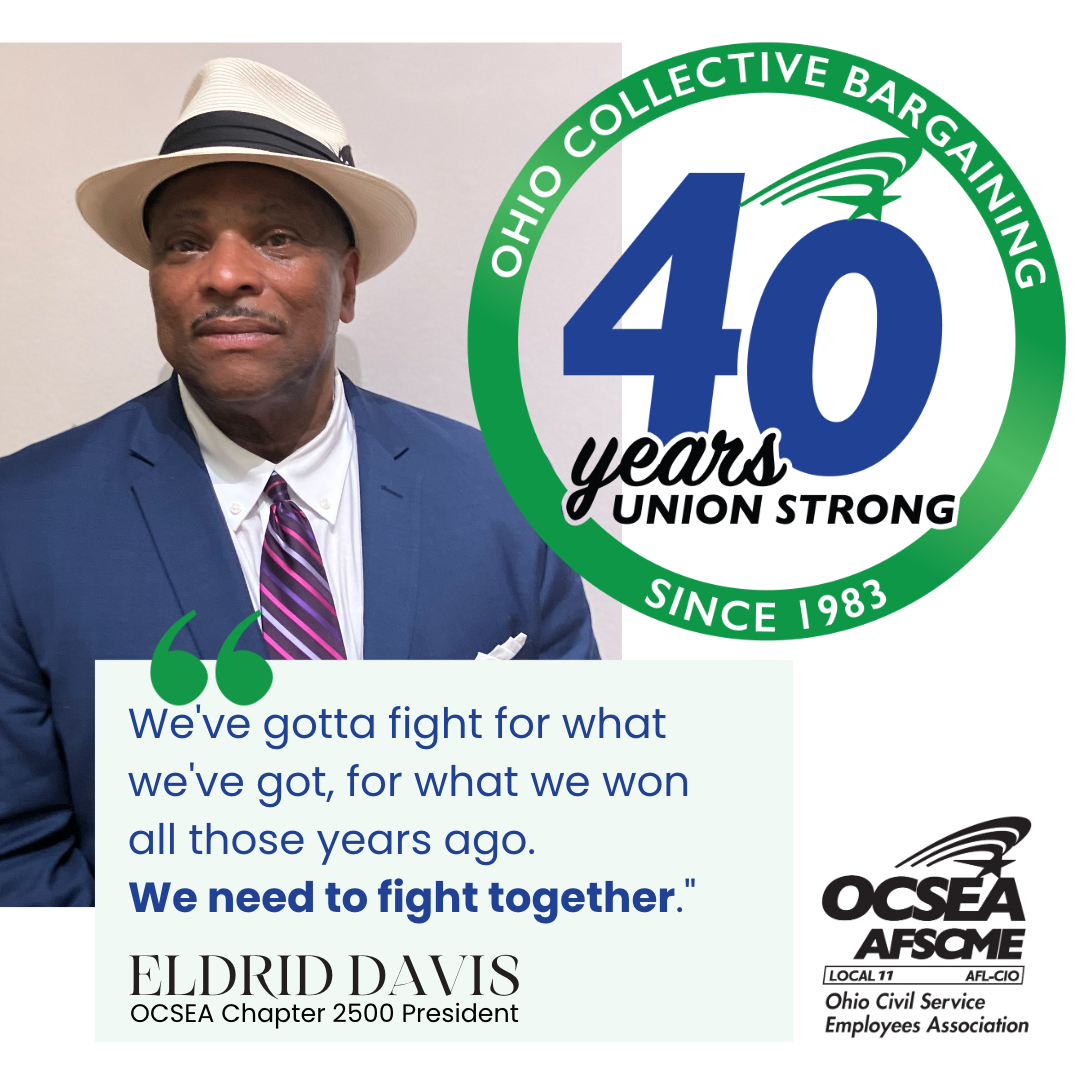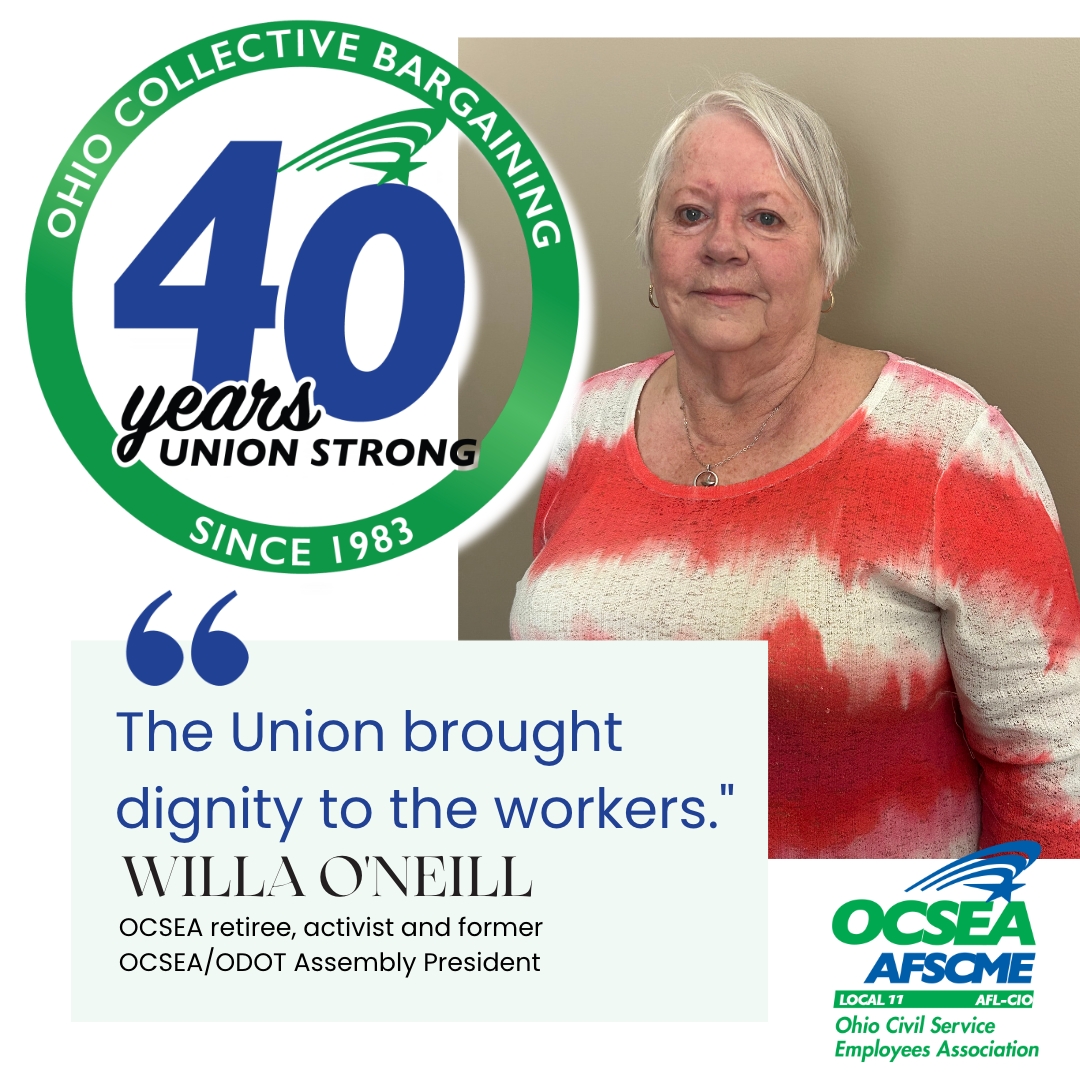This month, we continue to celebrate 40 years of Ohio Collective Bargaining. The law, giving Ohio's public union members the legal right to sit down and negotiate the terms of their employment, was signed into law by Governor Richard Celeste on July 6, 1983. Since then, union members have been fighting to build and protect their union contracts. This includes the rights of OCSEA members to bargain wages, health care, leaves, safety on the job, longevity, overtime, pick-a-post and so much more.
This milestone is a reminder of how far we've come as union members in Ohio, but it's also a stark reminder of all there is to lose. A union contract is more than a piece of paper, and our anti-union adversaries know that. "Only when we stick together in solidarity can we stand up and protect 40 years of union rights against those who want to dismantle them––now and in the future," said OCSEA Vice President Rocky Jolly.
OCSEA union brother Eldrid Davis has a 40 plus year career with the Ohio Expositions Commission. He remembers what life was like without a union. That's why he has dedicated his entire career to fighting for union rights for himself and his members.
"When I started as a student, I was making $2.45 an hour, and then $3-$5 an hour full-time. When the union came in and we got collective bargaining, that wage more than doubled, plus health care, plus leave, and overtime," said Davis, who is known as "E.D." in his union circle. "How many employers do you know that are just going to be gracious enough to give us raises without a union? None," said E.D.
From the beginning when the law went into effect, E.D. took the opportunity to become involved and to be a voice for members, first as a union steward, then on labor/management and safety committees and eventually as his chapter's president. Today, his chapter, Franklin Chapter 2500, represents hundreds of State OCSEA members across Columbus.
"We've gotta fight for what we've got, for what we won all those years ago. We need to fight together," said E.D. "Because they will be coming after what we've fought for. We need to be on guard. We need to stand together. And we need to always vote our jobs."
For OCSEA union brother and Franklin Chapter 2500 President Eldrid Davis, an over 40-year employee with the Ohio Expositions Commission, the power of being union has become a way of life.

OCSEA retiree, activist and former OCSEA/ODOT Assembly President Willa O'Neill describes below what collective bargaining––and a real union voice––meant for her in ODOT after being hired just after the first OCSEA state contract was negotiated. In the Ohio Dept. of Transportation, specifically, getting hired and fired was often tied to who you knew and the politics with which you aligned yourself. A union gave security to many employees during the change of the guard, so to speak, says Willa.
"I began working at ODOT in 1986, shortly after OCSEA had been voted in to represent the bargaining unit. For the first time, Union employees did not have to fear termination with each political change," said Willa. "Old management styles still existed, but with the support of OCSEA, leaders were trained and learned how to have a voice in how they were treated. The Union brought dignity to the workers."
For OCSEA retiree, activist and former OCSEA/ODOT Assembly President Willa O'Neill, having a union for her 30 plus year State career meant dignity, security and a real voice on the job.

For union activist and OCSEA retiree Joe Wing, collective bargaining has brought 40 years of worker voices to Ohio public service. Since then, union members have been fighting to build and protect their union contracts. This includes the rights of OCSEA members to bargain wages, health care, leaves, safety on the job, longevity, overtime, pick-a-post and so much more.
"This has been the best 40 years for public employees in Ohio," says Joe, who as a lifetime OCSEA union member continues to see the value in a union voice and union activism post-retirement. He serves his union brothers and sisters as treasurer for both the OCSEA/ODOT Assembly and his Chapter 2513.
Joe says we have to fight to make sure we don't ever go backward, only forward with our union voices. Learn more about being an OCSEA retiree HERE.

Former OCSEA president celebrates 40 years of Ohio collective bargaining
We continue to celebrate 40 years of Ohio Collective Bargaining, the law that gave Ohio's public union members the legal right to sit down and negotiate the terms of their employment.
And what better way to round out the month of celebration than to hear from former OCSEA President Ron C. Alexander, who knows first-hand the enormity of what collective bargaining meant for Ohio Public Employees. Ron has been there since the beginning of collective bargaining, and actually was one of the key activists to fight for the law's creation and passage. Ron was also right there in the room when the law was signed into law thirty years ago this month by Governor Richard Celeste on July 6, 1983.
Ron knows exactly what 40 years of collective bargaining means for Ohio. It means strength, unity and a real voice at the table. As OCSEA President from 1983 to 2007, he led the very first contract negotiations in 1986. Under his leadership, OCSEA grew to be the largest state employees union in Ohio, ushering in an era of strong and vital public sector union growth in Ohio and across the U.S.
"Collective bargaining for public employees makes Ohio a cut above the rest," said Ron. "It means having a real voice on the job, not only to impact things like wages and benefits and safety, but also to help guide and create value in public services that impacts every single Ohioan."
Ron is proud of his legacy with OCSEA and Ohio and continues to fight for union rights that he hopes will go on and on for generation after generation of Ohio public employees to come. Today, Ron continues to fight the good union fight as the head of the OCSEA Retiree group and Retiree State Board representative.
